OpenAI DevDay Announces ChatGPT’s New “Role”: Create Your Own GPT?
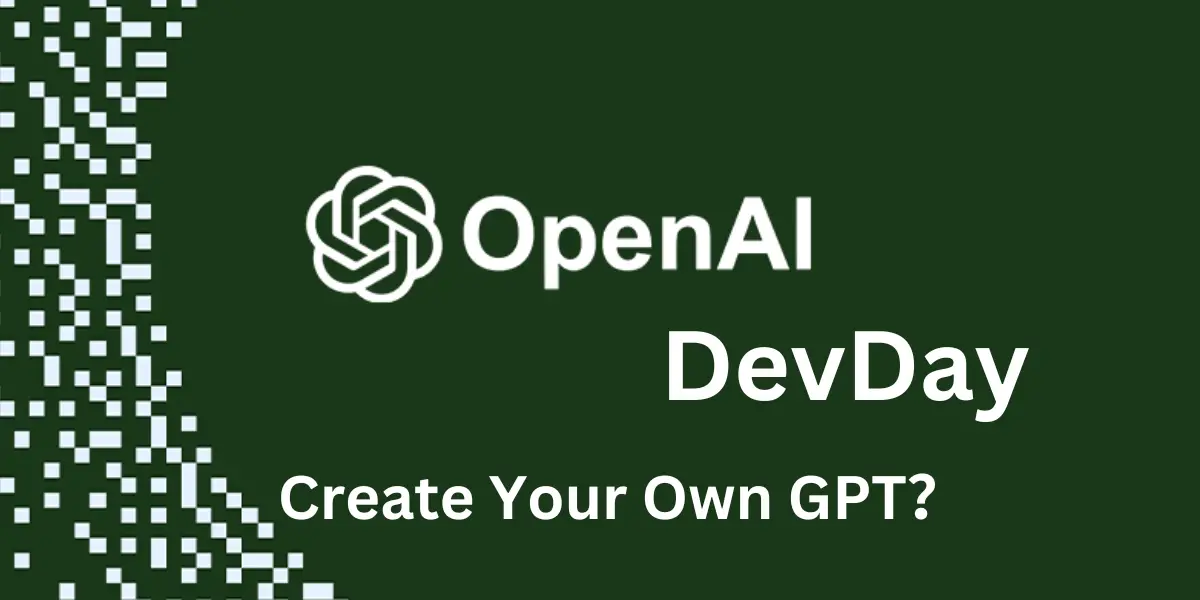
As artificial intelligence technology rapidly advances, OpenAI’s ChatGPT has demonstrated unprecedented flexibility and functionality in its latest update. From the personalized GPT Builder to the open-source voice and image modules, and the deepening collaboration with Microsoft, OpenAI is leading a new era of AI. These advancements provide powerful tools for the developer community and enrich the interactive experience for a broad user base.
OpenAI’s recent update introduced the GPT Builder, a tool allowing users to customize personalized GPT models, and a new GPT Store offering creators the opportunity to share in revenue. Meanwhile, the upgrade of the GPT-4 API to GPT-4 Turbo significantly enhanced the ability to process long texts and reduced costs. Additionally, OpenAI announced the open-sourcing of its voice and image modules, further promoting the sharing and innovation of technology. Concurrently, OpenAI’s collaboration with Microsoft deepened, jointly advancing developer tools such as GitHub Copilot. The usage data of GPT reflects its widespread global impact, heralding the boundless possibilities of AI technology in the future.
Table of Contents
What is OpenAI DevDay?
OpenAI DevDay is a landmark event that marks a confluence of the world’s most innovative minds in AI. Scheduled for November 6, 2023, in San Francisco, CA, it’s a day dedicated to the exploration and celebration of cutting-edge AI technologies. This event is designed to connect developers globally, offering a platform to showcase new tools, foster idea exchange, and encourage collaborative advancements in the field of artificial intelligence. OpenAI DevDay is not just a conference; it’s a hub of inspiration for developers, researchers, and enthusiasts, providing insights into the latest AI trends and OpenAI’s contributions to the future of technology.
Also read:OpenAI’s Developer Conference 2023: A Glimpse into the Future of AI
Why is DevDay important?
DevDay stands as a crucial juncture in the AI calendar, primarily because it’s where OpenAI, a leading entity in AI research and development, shares its latest innovations with the world. It’s a day that signifies progress, learning, and community. For developers, it’s an opportunity to gain firsthand experience with OpenAI’s newest tools and APIs, which can be transformative for their projects. For the AI community, it’s a chance to discuss, debate, and shape the future of AI ethics, policy, and application. DevDay’s importance also stems from its role in democratizing AI, making advanced tools and knowledge accessible to a broader audience, thus driving forward the mission of safe and beneficial AI for all.
Everyone can customize GPT
GPT Builder: Crafting GPTs with Unique Skill Attributes
The GPT Builder is an innovative tool launched by OpenAI, which allows users to customize their own ChatGPT model via a simple conversational interface. This tool’s release signifies that users no longer need extensive programming knowledge to build an AI assistant with a specific skill set. Users can specify the types of tasks they wish the GPT to perform, such as database management, automating email responses, or handling SMS services. The core advantage of the GPT Builder lies in its ease of use and flexibility, allowing users to tailor the behavior and response patterns of the GPT to their needs.
This customizable GPT can connect to various APIs, performing tasks such as data retrieval, record updating, or automating workflows. For instance, an e-commerce business could customize a GPT to manage its online customer service, while a health consultancy platform might create one specialized in answering health and nutrition questions. The introduction of the GPT Builder not only provides a powerful productivity tool for individuals and enterprises but also opens up new possibilities for the application of OpenAI’s technology, allowing it to permeate more broadly into everyday work and life.
Moreover, the launch of the GPT Builder also reflects OpenAI’s commitment to the democratization of artificial intelligence. By lowering the barrier to technology, OpenAI is striving to enable a wider user base to leverage cutting-edge AI technology, accelerating the widespread adoption of AI technologies and energizing digital transformation across various industries.
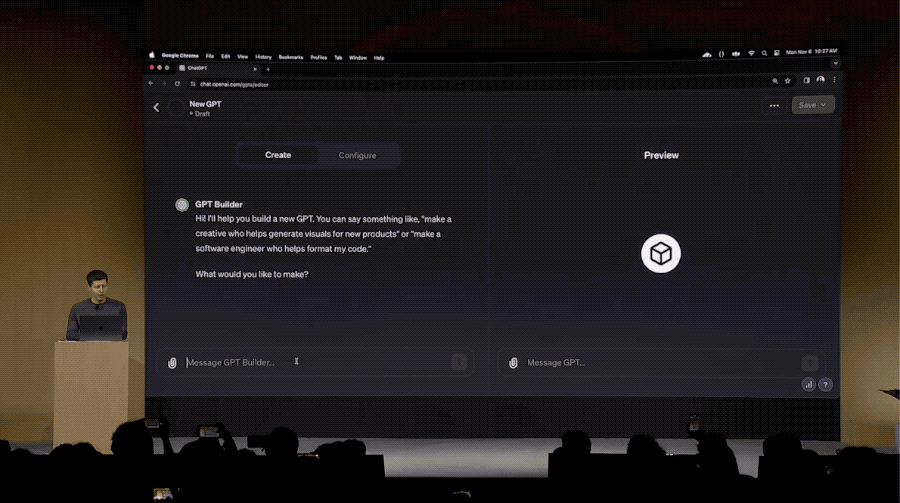
GPTs: Sharing Revenue with Creators
The introduction of the GPTs platform marks OpenAI’s significant venture into the realm of content creation and distribution. Through this platform, creators can upload their customized GPT models to the GPT Store for others to use and subscribe to. This model provides creators with a novel source of income, as they can generate revenue by creating GPT models that are useful, entertaining, or educational.
The launch of the GPT Store means that users can now easily discover and subscribe to GPT models that suit their needs, ranging from text generation to data analysis, from language learning to gaming entertainment. For creators, it represents a stage to showcase their creativity and expertise, as well as a potential revenue stream. For users, it offers a convenient repository where they can find GPT models that solve specific problems or meet certain needs.
The design of the GPTs platform fosters collaboration and competition among creators, driving the development of innovative GPT applications. Creators can refine their models based on user feedback, and the user experience is continuously enhanced with model iterations. The success of this model depends on an active community and a fair revenue-sharing mechanism, areas that OpenAI will continue to optimize and refine moving forward.
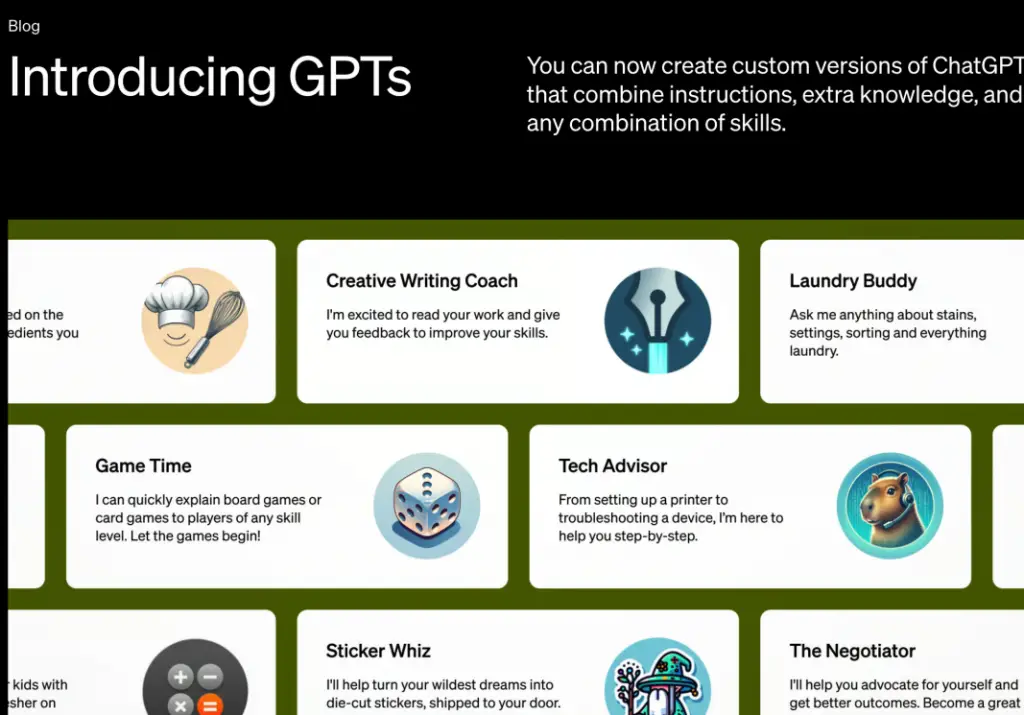
Multi-modal API is coming
GPT-4 API Upgrade to GPT-4 Turbo
The launch of GPT-4 Turbo is a major upgrade in OpenAI’s API services, expanding the context limit from 8K to 128K, significantly boosting the model’s capability to handle longer texts. This means that developers can now build more complex applications, managing longer conversations and larger datasets. GPT-4 Turbo offers enhanced support for applications dealing with extensive text information, such as legal document analysis and the composition of lengthy articles.
Additionally, GPT-4 Turbo introduces JSON-formatted output control, allowing developers to receive and process GPT’s responses in a more structured manner. This is an important enhancement for applications requiring precise format outputs, such as programming code generation and data reporting. Moreover, the new API supports repeatable outputs by introducing a seed parameter to ensure reproducible results for the same inputs, which is crucial for developers testing and optimizing the model.
The release of the multimodal API expands the application scope of GPT-4 beyond text to include image and speech data, paving the way for multimodal application development. For example, one could create an intelligent assistant that understands voice commands and analyzes image content. The combination of these capabilities offers developers more innovative space and users a richer and more natural interaction experience.
In terms of cost reduction, GPT-4 Turbo’s pricing strategy provides developers with greater flexibility and affordability. By significantly lowering the cost of API calls, OpenAI is working to lower the barriers to using advanced artificial intelligence technologies, which will aid in the birth of more innovative applications.
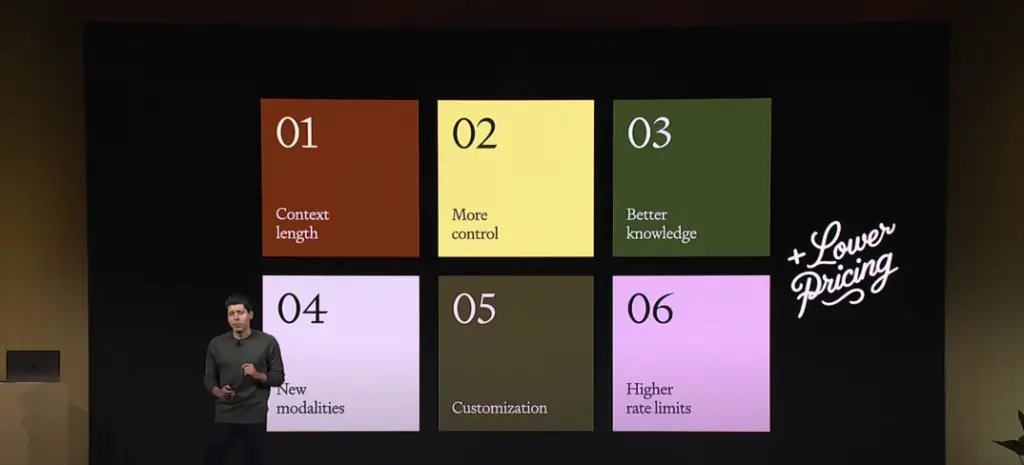
Launch of GPT Assistant API
The release of the GPT Assistant API provides developers with a robust set of tools to build smarter, more interactive applications. This API integrates multiple functionalities, including a code interpreter, knowledge retrieval, and function calls—all indispensable parts of modern application development.
The code interpreter feature positions the GPT Assistant API as a powerful programming aid that can help developers understand and debug code, accelerating the development process. The knowledge retrieval functionality equips GPT with formidable information retrieval capabilities, enabling rapid sourcing of relevant data from extensive databases. The function call feature allows GPT to interact with other APIs and services, performing tasks like sending emails, making reservations, or pulling up weather forecasts.
These functionalities, when combined, make the GPT Assistant API a versatile development tool that can be used across industries and disciplines. For example, it can support a legal research firm in sorting and analyzing case files or aid a marketing team in creating data-driven campaigns. By providing a comprehensive solution for complex tasks, OpenAI continues to push the boundaries of what’s possible with AI-assisted development.
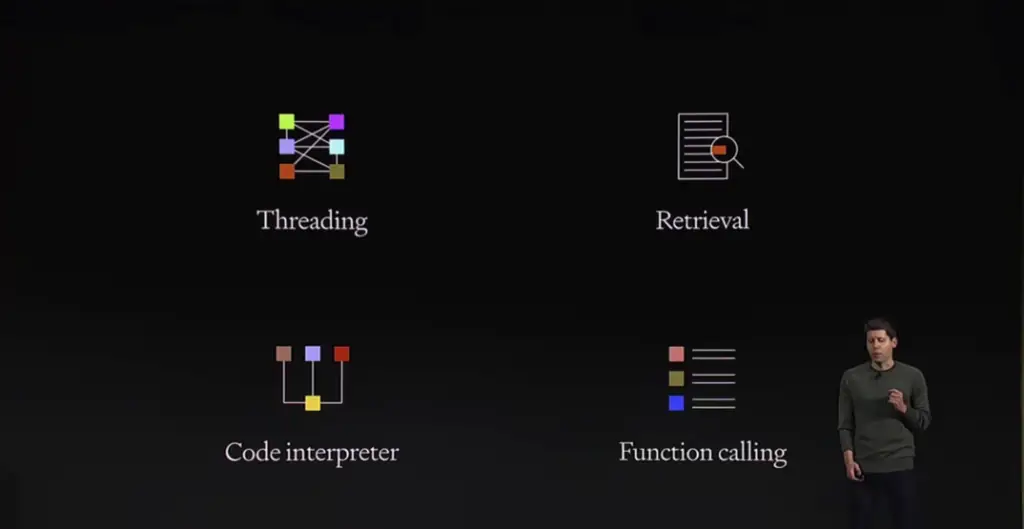
Open Source Voice and Image Modules
In its latest update, OpenAI announced the open-sourcing of key technologies, particularly in the voice and image modules. The open-sourcing of WhisperV3 signifies OpenAI’s commitment to promoting technological sharing and innovation. WhisperV3, an advanced speech recognition system, will be freely usable and modifiable by developers for their projects. This decision could profoundly impact the speech recognition market by lowering barriers to entry and encouraging wider innovation and application.
Furthermore, OpenAI plans to make its image API available and open-source the Consistency Decoder, an alternative to the Stable Diffusion VAE. This move is set to unlock new possibilities in the field of image generation and processing. Open-sourcing the Consistency Decoder means that developers and researchers can employ this module to create new image generation algorithms or improve existing image processing techniques. This initiative will not only accelerate technological advancement but also promote the emergence of innovative products.
OpenAI’s array of open-source initiatives demonstrates its role as a leading AI research institution committed not only to the commercialization of its products but also to the healthy progression of the industry at large. Through these open-source projects, OpenAI aims to build a more active and diverse developer community, enhancing technological transparency, strengthening collaboration, and ultimately advancing artificial intelligence.
One More Thing
Microsoft Collaboration
The collaboration between Microsoft and OpenAI continues a longstanding strategic partnership between the two companies. The deepening of this relationship, particularly through products like GitHub Copilot, showcases their shared vision of empowering developers. GitHub Copilot, a programming assistant powered by OpenAI technology, has made a significant impact in the developer community by automating code suggestions and greatly improving programming efficiency.
Microsoft’s strong emphasis on security and its continued support for infrastructure underpin the foundations for OpenAI’s products and services. This collaboration provides OpenAI with the necessary computational resources and cloud services, as well as support for its research and development initiatives. Moreover, Microsoft’s global reach and market channels offer broader application scenarios and user bases for OpenAI’s technology.
This collaborative model may serve as a paradigm for future AI partnerships, illustrating how cutting-edge research can be transformed into practical products and services through cooperation, while ensuring the security and reliability of the technology. As the collaboration progresses, more innovations and breakthroughs in the AI field are anticipated from Microsoft and OpenAI.
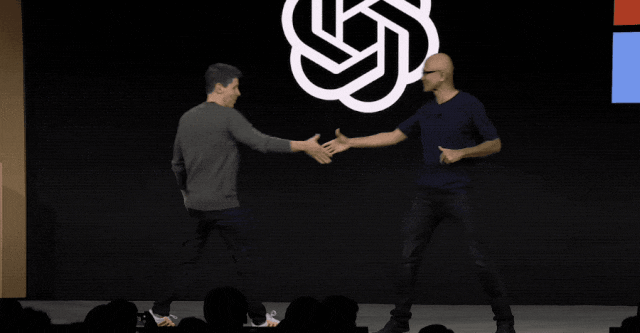
GPT Usage Data
The GPT usage data disclosed by OpenAI reveal the extensive global impact of its technology. The fact that there are 100 million weekly active users and 2 million developers building on the API not only proves the maturity of GPT technology but also its widespread application across industries. Behind these numbers is a vast user base relying on GPT in fields such as education, programming, content creation, and customer service to enhance efficiency and quality.
The rapid growth of the developer community, particularly in API usage, indicates OpenAI’s success in providing AI services that are easy to integrate and use. These services have become central to numerous applications and business processes, helping enterprises and individuals solve real-world problems. Additionally, this growth highlights OpenAI’s dual achievements in technological innovation and community building.
As OpenAI continues to push technological boundaries and expand the reach of its products and services, the usage of GPT is expected to keep growing. These figures are not just symbols of OpenAI’s accomplishments but also a robust testament to its role in advancing AI globally. With ongoing advancements and expanding applications, OpenAI and GPT may shape the future development trends of many industries.
ChatGPT is turning into a UGC platform
As we delve into the transformative updates from OpenAI’s DevDay, one of the most intriguing revelations is the evolution of ChatGPT into a user-generated content (UGC) platform. This shift marks a significant turn in how we interact with AI, moving from passive consumption to active creation. Let’s explore what this means for the future of user engagement and content creation.
ChatGPT as a UGC Catalyst
The transformation of ChatGPT into a UGC platform signifies a new era where users don’t just receive content from AI but actively contribute to it. This paradigm shift enables a more dynamic interaction, where user inputs become an integral part of the content creation process. It’s a step towards a more collaborative AI, where the lines between creator and creation blur, leading to a richer, more personalized AI experience.
Personalization and Creativity
With ChatGPT’s new role as a UGC platform, personalization reaches new heights. Users can steer the AI in directions that resonate with their individual tastes and preferences, crafting content that is uniquely theirs. This not only enhances the user experience but also fosters a creative partnership between AI and humans, with each contributing to the creative process.
Community-Driven AI Development
This evolution is also a nod to the importance of community in AI development. By turning ChatGPT into a UGC platform, OpenAI is recognizing the value of user feedback and engagement in shaping AI models. This approach ensures that AI development is not just about technological advancement but also about meeting the real-world needs and desires of its user base.
Concluding Thoughts
The announcements from OpenAI DevDay herald a transformative future for AI, one where user engagement and content creation take center stage. As ChatGPT becomes a platform for UGC, it invites users to become co-creators, shaping the AI with their interactions. This is not just an upgrade to existing technology; it’s a reimagining of the relationship between AI and its users, promising a more personalized, creative, and community-focused future.

